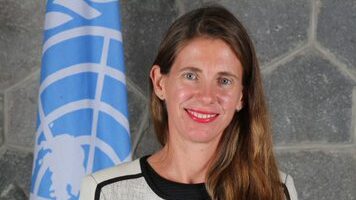
The pandemic-induced crisis has caused grave consequences on society as a whole and vulnerable groups. What can we do to aid society’s recovery and reduce inequalities that were especially visible when it comes to vaccination?
Since the onset of the pandemic, we’ve seen examples of tremendous solidarity as people came together to support each other in times of need. At the same time, the world seems an angrier place, especially during COVID, in response to perceived inequalities and injustice. In crisis, it’s important that no one is left behind, that help is equally available to everyone, especially those already vulnerable.
Covid-19 vaccination is a good example. In Serbia, the Government secured a stable supply of vaccines for all and established a user-friendly e-service for the citizens to apply for vaccination.
But some people in Serbia don’t have access to digital tools and services. To make sure that everyone, including Roma, refugees and migrants and blind people are equally informed about the benefits of vaccination, we partnered with the Public Health Institute “Batut”, WHO, UNICEF and UNHCR to create a national public awareness campaign “Bring back the hug”, and distributed leaflets with key information in Roma, Farsi and Arabic, as well as in Braille.
We also engaged Roma UN volunteers who visited Roma settlements to inform 11,500 inhabitants about the importance of Covid-19 immunization and help them register for and get a vaccine.
2022 will be all about economic recovery, further development of science, the continuation of dialogue in resolving crises, as well as the rehabilitation of the entire planet. What issues and topics should be addressed (e.g. climate change, green projects, reducing inequalities in society, etc.)?
When recovering from this crisis, we must keep in mind that the economy can no longer grow at the expense of the planet. To stabilize the climate and prevent the rise of the average global temperature above 1.5 degrees, the green transformation of our economies and societies should be front and centre.
In Serbia, there’s an economic imperative to address the climate change emergency. For the country’s robust economic growth to be maintained, and to bring in new growth, deep decarbonization is needed, particularly if we have in mind the key export market – the EU, where consumers are already favoring goods with a low carbon footprint. By reducing its carbon intensity, the Serbian economy will become more competitive, and eligible for green funds.
To bring about this change we all need to engage – not just the national and local governments, but also businesses, civil society organizations and citizens. In 2022, with EU support and in partnership with SIDA and EIB, UNDP will mobilize all the actors in the society to create a cleaner, healthier, and economically stronger Serbia-together.